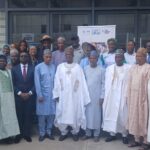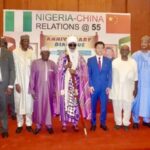By Oluwatope Lawanson
Mr Adeyemi Aseperi-Shonibare, an integrated marketing consultant, has described Nigeria’s National Halal Economic Strategy as a bold and inclusive pathway to sustainable growth and global competitiveness.
Aseperi-Shonibare, Chief Executive Officer of PRIMAA Productions, said this in an interview with the News Agency of Nigeria (NAN) on Sunday in Lagos.
In February, the Federal Government signed a cooperation agreement with Saudi Arabia’s Halal Products Development Company (HPDC) to establish Nigeria as a leading player in the global halal market valued at $7.7 trillion.
Halal economy is an economic system based on Islamic principles, where goods and services are produced and traded in compliance with Shariah law.
The consultant explained that the strategy, if well implemented, would help diversify the economy and open new investment opportunities in agriculture, manufacturing, finance and tourism.
Aseperi-Shonibare said the Halal economy had evolved beyond a religious framework into a multitrillion-dollar global industry.
He noted that it covered food, pharmaceuticals, cosmetics, fashion, logistics and hospitality services consumed worldwide.
According to him, Halal-certified products have gained acceptance in advanced economies, including the United Kingdom, the United States, Canada and Australia.
He said the popularity of Halal products showed that the concept represented quality assurance, not religious practice.
He said Nigeria, with its population and agricultural resources, must not remain a passive observer in the global Halal market.
Aseperi-Shonibare said the Federal Government’s unveiling of the Nigeria National Halal Economic Strategy was a significant step toward repositioning the economy.
Although the official launch was postponed, he said the delay offered an opportunity to strengthen the framework.
He said the extra time should be used to ensure transparency, national unity and collaboration among public and private actors.
Aseperi-Shonibare said the Halal economy was not about religion but about ethical, clean and traceable production systems.
He noted that adopting Halal standards would boost Nigeria’s industrial reputation and improve access to export markets.
According to him, Halal certification is as neutral as organic or vegetarian labelling, focusing purely on quality and trust.
“Halal is not about changing religion; it is about raising standards and promoting excellence in production.
“The strategy can generate massive jobs across farming, processing, packaging, certification, logistics and hospitality sectors.
“Nigeria can learn from Malaysia, Indonesia and Saudi Arabia, which has successfully integrated Halal principles into national economic plans,” Asperi-Shonibare said.
The consultant maintained that the global Halal economy is worth over three trillion dollars and continued to expand rapidly across regions.
He identified five key pillars of successful Halal industries as credible certification, compliant infrastructure, export development, tourism and Halal finance.
Aseperi-Shonibare said developing these pillars in Nigeria would attract investors, boost exports and enhance product credibility.
He said Nigeria’s agricultural exports such as beef, poultry, cocoa, Shea products, spices and grains could easily meet international demand under proper certification.
He said Halal certification would help Nigerian goods penetrate markets in GCC countries, North Africa, Europe and Southeast Asia.
The consultant also emphasised that Halal production would also open doors for Nigerian brands in international supermarkets.
He noted that the move would enable Nigerian youths to build careers in certification technology, food science and ethical finance.
Aseperi-Shonibare dismissed fears that Halal development could threaten Nigeria’s secular identity or promote religious bias.
He said Halal certification applied to products, not people, stressing that it was about standards, not faith.
He said, “Eating Halal bread does not change anyone’s religion, just as eating vegetarian food does not make one a vegetarian.”
He urged Nigerians to erase fear and embrace the economic opportunities the Halal sector offers, saying, “if executed transparently, it will enhance industrialisation and job creation.”
He said it would also improve Nigeria’s image as a producer of safe and high-quality goods.
Aseperi-Shonibare called for collaboration between federal and state governments, regulatory bodies and private investors.
He said such synergy would help build testing laboratories, logistics facilities and certification systems across the country.
Aseperi-Shonibare said Nigeria must move from exporting raw materials to producing globally competitive goods.
He said Halal standards would enable the country to compete favourably in international trade and attract more foreign exchange.
According to him, when Nigeria certifies, Nigeria qualifies for premium access to global markets.
He said the Halal sector could help Nigeria achieve inclusive prosperity by uplifting citizens beyond economic statistics.
He urged policymakers to accelerate the implementation process and ensure transparency and stakeholder engagement.
He said, “The world will not pause while Nigeria hesitates; action must replace delay.”
Aseperi-Shonibare added that the Halal economy offered Nigeria a practical route to industrial growth, job creation and national development.
He stressed, “Let us choose prosperity over suspicion and action over hesitation. The world is open for business, and Nigeria must be too.” (NAN)(www.nannews.ng)
Edited by Olawunmi Ashafa












